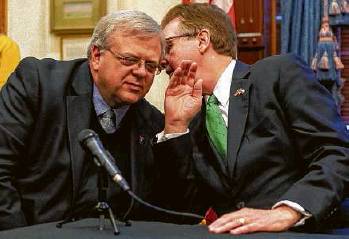Commentary
Bigot legislation would damage Lone Star State’s economy
CHRIS TOMLINSON
Legalized discrimination in the name of religious belief is an ancient license for bigotry that has led to horrible wars and human rights abuses.
If the Legislature approves any of the 18 theocratic bills that bless maltreatment of LGBT people, fundamentalists not only will ruin lives, they will severely damage the state’s economy.
“We know discrimination when we see it,” said Phillip Jones, CEO of Visit Dallas, the city’s convention and visitor’s bureau. “We know it’s bad for Texas communities, and we know it’s bad for the Texas economy.”
More than 50 companies, chambers of commerce, professional associations and visitors bureaus held a news conference at the Capitol last week and called on lawmakers to reject discriminatory legislation. Among them were Amazon, Apple, Fidelity, PepsiCo and Unilever.
Republican leaders promised this legislation was dead, but the culture warriors have found a new rallying cry to punish and humiliate people for their nonheterosexual orientation or nonconforming gender identity. Discrimination is fine and dandy as long as you cloak it in religious liberty.
Hogwash.
America has been down this road. White Southerners argued that the Bible encourages racial segregation and said equal treatment of African-Americans was a violation of their religious liberty. The U.S. Supreme Court ruled against them.
Every American school child knows that your liberty extends only so far as another person’s civil rights.
Lubbock’s state Sen. Charles Perry and Sen. Paul Bettencourt of Houston didn’t learn this basic civics lesson. They are behind SB 17, the bigot bill that would allow state-licensed professionals to invoke their religious beliefs to deny services and discriminate.
Doctors, counselors, plumbers, hairstylists and 61 other licensed professionals could use religious beliefs to escape penalty for biased or hostile behavior while on the job. State agencies only would require emergency medical personnel and law enforcement officers to respect Texan’s civil rights.
Most Texans oppose the bigot bills. Recent polling shows that 66 percent of Texans favor nondiscrimination protections for LGBT people, said Jessica Shortall, executive director of Texas Competes, a business alliance opposed to the legislation.
“Texans want LGBTQ people to have the same opportunities to live and work, the same access to services and to contribute to their communities as everyone else, and to be free from fear of discrimination,” she added. “A majority of people in every age group, every ethnic group, every faith group and every political persuasion feel this way.”
Even after a hearing before the Senate State Affairs Committee, where most people testified against the bill, eight Republicans and one Democrat recommended it to the full Senate. Lt. Gov. Dan Patrick, who says he is a Christian above all, brought the bill up for a vote Tuesday, and the Republican-majority passed it.
Patrick may think legalizing bigotry will make Texas a better place, but most Americans disapprove of state-sponsored discrimination, said Michelle Crowley, vice president for global growth at the international Professional Convention Management Association.
Organizations will not bring events to Texas if discriminatory bills become law, and most convention contracts allow organizers to cancel if such laws take effect.
“Boards of organizations and corporations of all kinds are watching this legislative session and will cancel their meetings,” she said. “When an association comes to a city, it needs to be sure that their entire membership base is protected and that they feel welcome.”
Merely talking about these laws makes it harder to attract top workers, said Jackie Padgett, communications manager at Silicon Labs, an Austin-based semiconductor company.
“Talented workers have concerns about moving to, or staying in, a state that pursues discriminatory policies,” she said.
In addition to SB 17, there are 17 other bigot bills. They include SB 1009, SB 1978, HB 2109, HB 3172 and HB 4512 which would allow discrimination around marriage. SB 85, SB 1107, HB 2892, HB 4357 would allow discrimination in health care and counseling services. Government officials would be allowed to discriminate under SB 2013 HB 1035 and HB 4041. While SB 880 and SB 2325 would allow discrimination in higher education.
Lastly, many observers believe the revised version of SB 15, which would ban local governments from imposing ordinances related to wages and benefits, also would strike down nondiscrimination ordinances that protect LGBT people.
Gov. Greg Abbott and Speaker Dennis Bonnen should know that discriminating against someone for how they were born is unacceptable in the public square. More importantly, they should know the Texas economy depends on upholding this fundamental freedom and kill these bills.
Tomlinson writes commentary about business, economics and policy. chris.tomlinson@chron.com twitter.com/cltomlinson

